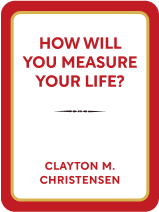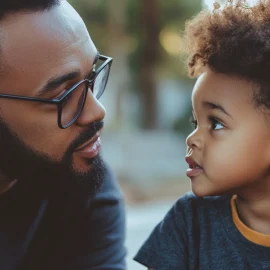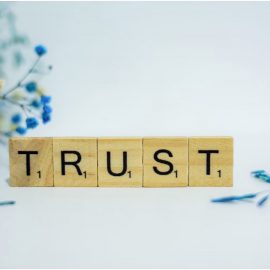

This article is an excerpt from the Shortform book guide to "How Will You Measure Your Life?" by Clayton M. Christensen. Shortform has the world's best summaries and analyses of books you should be reading.
Like this article? Sign up for a free trial here .
Do you want to know how to be a better parent? How can you help your children to face challenges independently?
Parenting is difficult at the best of times, but it can be easier if you have some practical rules and advice to follow. If you want to know how to be a better parent, you can look at strategies for building independence, investing in your children, and avoiding outsourcing.
Read on to discover how to be a better parent with the following helpful tips.
Tips for How to Be a Better Parent
Bringing up a child is one of the toughest things you can do. It’s hard to know if you’re doing it right or if there are any improvements you can make.
Follow these five tips to find out how to be a better parent.
1) Invest in Your Children
People who are achievement-driven often mistakenly believe they can sequence their investment in their personal lives, especially when it comes to children. For example, you might think you can focus on your career when your kids are small, then shift your attention to them when they’re older and start interacting more with adults.
However, if you wait until they’re older, you’ll have lost critical developmental time that you can’t get back. It’s crucial that parents devote time to children from the earliest months of life. Research shows that parental interaction is particularly important in cognitive development. The first year of life is the most important time for children to hear words. The number of words they hear earlier in life correlates with later school performance on vocabulary and reading comprehension tests.
The way parents speak also matters, according to research. Simple directions like “finish your milk” have little effect on cognitive development. However, face-to-face conversations in adult language, commenting on what you’re doing or asking questions, have a huge impact. Such conversations play a bigger role in children’s cognitive development than income, ethnicity, or parents’ education.
Parents who don’t invest early in their children’s intellectual development miss a critical opportunity to give them an edge when they start school, which is key if you want to know how to be a better parent. You can’t defer investing in your children and relationships and expect to make it up later.
2) Rethink Outsourcing
If you want to know how to be a better parent, rethink outsourcing.
In recent years, many industries have outsourced certain functions and processes, including the pharmaceutical, auto, oil, information technology, and semiconductor industries. Investors, consultants, and academics have encouraged this as a way of increasing efficiency and reducing costs. Similarly, parents have outsourced certain family functions to coaches, teachers, and other adults.
While outsourcing can be a benefit, it can also undermine companies and families when decision-makers delegate the wrong things. The way to determine what the wrong things are is to understand and apply the theory of capabilities.
It’s critical that children develop processes for doing things. However, our society and families are increasingly limiting children’s ability to do so by outsourcing.
A generation ago, more U.S. families involved children in work, such as gardening, caring for animals, preserving food, and doing sewing and repairs. Children developed processes for solving problems and getting these things done. Wealthier parents have outsourced much of this home-maintenance work today. In its place, parents go overboard in providing resources for children—youth sports, music and art lessons, summer camp, and semesters abroad.
While these opportunities (resources) allow some children to apply what they learn, the activities don’t resonate with or engage many others. This is because the opportunities tend to involve things parents think their children will like, or that reflect the parents’ ambitions rather than the children’s interests. Another issue is that the activities may be too scripted.
Along with providing opportunities, parents need to ensure the experiences challenge children to take responsibility, do difficult things, and create or invent things. These help children develop the processes they’ll need in the future, as well as the self-esteem that comes from accomplishment.
A focus on showering children with resources has resulted in a disproportionate number of young adults lacking the capabilities, especially processes, necessary for employment. Parents should start early with providing problems for their children to solve.
3) Encourage Independence
Similarly, parents should determine what experiences their children will need to be successful as they grow, and create those experiences. This is crucial in understanding how to be a better parent. Help them learn important lessons early in life.
Encourage children to aim high and keep trying if they fail. Also, resist the temptation to solve children’s problems for them—don’t bail them out by helping with or doing a project they left until the last minute. Otherwise, you’re teaching them to take shortcuts and expect others to save you. Let them learn from the consequences of their mistakes.
Often it’s easier to do things for kids—for instance, to plan their scout camping trip—but when you let children do it themselves, they learn about planning, organization, and teamwork. If a child doesn’t learn what you’re trying to teach from one experience, try something else. Preparing children for the future is one of the more important things you can do for them.
4) Assess Capabilities
In the same way companies weigh their capabilities, you can assess your own and your family’s capabilities—your resources, processes, and priorities.
In considering your own capabilities, you’ll find strengths, as well as areas you wish you’d done more to develop. You can’t make up for lost opportunities, but as a parent, you can help your children make the most of their capabilities.
In the context of your resources, processes, and priorities, think about what your children will need to be able to do, given the challenges they’re likely to face:
1) Resources are the first factor determining how a child’s capabilities develop. These include financial and material resources, talent, knowledge, experience, and relationships.
2) Processes are the second factor determining how a child’s capabilities develop. Processes are ways a child uses her resources to do or create something new. Processes include how she thinks, questions, solves problems, works with others, and so on; they’re unique to the child.
Resources and processes work differently: Knowledge provided to a child in class is a resource she can use—for instance, to get a better grade on a test. However, when the child takes what she’s learned (the resource) and applies it to doing an experiment or creating an app, she’s using a process.
3) Priorities are the third factor determining how a child’s capabilities develop. Children’s priorities mirror those of adults (for example, school, sports, family, work, and faith). As with adults, their priorities guide their decisions—including what gets the most attention, what they procrastinate on, and what they ignore.
Here’s how the three components of capability work together: Resources are what a child uses to do something; processes are the way she does it; her priorities are why she does it.
5) Try This Exercise
Parents need to ensure that the experiences they provide challenge children to take responsibility, do difficult things, and create or invent things. These help children develop processes they’ll need in the future. Use the following exercise if you want to know how to be a better parent:
- List the two to three most important experiences/activities you are providing to your children (for example, music lessons, church activities, chores, or sports). Why did you choose these activities?
- What are some process capabilities your children need for the future? Processes are ways a child uses her resources to do or create something new. Processes include how she thinks, questions, and solves problems.
- Do the experiences listed above help your children build process capabilities? If so, how? If not, what specific experiences can you provide to help your children build process capabilities?

———End of Preview———
Like what you just read? Read the rest of the world's best book summary and analysis of Clayton M. Christensen's "How Will You Measure Your Life?" at Shortform .
Here's what you'll find in our full How Will You Measure Your Life? summary :
- How economic theories that help businesses succeed can also help individuals make better life decisions
- How to build a career that makes you happy
- How to deepen your relationships with your spouse and children






